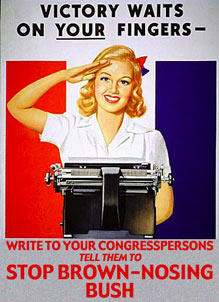 Today a local antiwar group asked my advice on this topic, so I thought I'd share what I recommended more broadly.
Today a local antiwar group asked my advice on this topic, so I thought I'd share what I recommended more broadly.Suppose you're an antiwar activist. You live in one of the roughly 190 safe Democratic Congressional districts around the country. You trust that the Democrats in your district overwhelmingly oppose the Iraq war -- in fact many have been against it since long before March 2003; subsequent failures have only confirmed their opinion that Bush's war is a murderous boondoggle. But your Democratic congressperson has not done enough that you have heard of to get the US out of Iraq. What do you do?
Find out some basic facts: for starters, how did your Congressperson vote on the Iraq War Resolution in October of 2002 that gave President Bush the green light to start a war? One hundred and twenty-six Dems voted no at that time; you need to know whether you have one of those. You can check here. If you do have one of early naysayers, your Congress member will have a much easier time calling for withdrawal now, unlike a famous Presidential candidate who "voted for it before he voted against it" (and now seems to be for it again.)
Next, it would be a good idea to know whether your Congress member has done anything since then to oppose the war, such as sign on to Rep. Lyn Woolsey's resolution calling for the President to make a plan for immediate withdrawal or Rep. Barbara Lee's resolution declaring that it is not US policy to establish permanent military bases in Iraq. The former had 34 co-sponsors in January 2005; the latter had 43 in June.
Look at your own Congressperson's web site. What does (s)he say about the war, if anything? Think about what you know about your Congressperson's general role in the House -- is (s)he in the leadership, a maverick, invisible?
Finally, do you know who the Congressperson turns to for personal support, for friendship? Congresspeople's personal connections can be significant policy influences; during the 1980s Democratic House Speaker Tip O'Neill was a surprisingly good vote on issues about US policy in Central America because his aunt was a Maryknoll nun with connections to the region.
Once you have a sense of the Congress member's positioning, then you should figure out what to ask of your representative:
- Perhaps you are lucky enough to be represented by one of the few who both voted against the war resolution and supported Woolsey and Lee; if so, thank the member for their leadership! Congresspeople need to know someone is paying attention when they do something right.
- Many more Democrats are represented by Congress members who voted against war in 2002 and since have kept their heads down; ask them to pick up the antiwar leadership role again -- are they going to let Republican Senator Chuck Hagel lead the antiwar movement in DC? Calls, letters, emails, public meetings can help. Ask them to join as co-sponsors on the Lee and Woolsey resolutions. We'll know the antiwar movement is succeeding when more of these members speak out.
- With bad luck, you've got a Democratic who is pro-war. Even those come in two kinds: one set that made a wrong bet that the war would be quick and easy; another lot who believed and may still believe Bush's lies about the war. These people should face the entire repertoire of pressure tactics; not only calls and letters, but eruptions of antiwar protest at their public forums and visits from angry constituent groups including veterans if possible, tempered only by a genuine effort to win them over as will have to be done eventually.
No comments:
Post a Comment